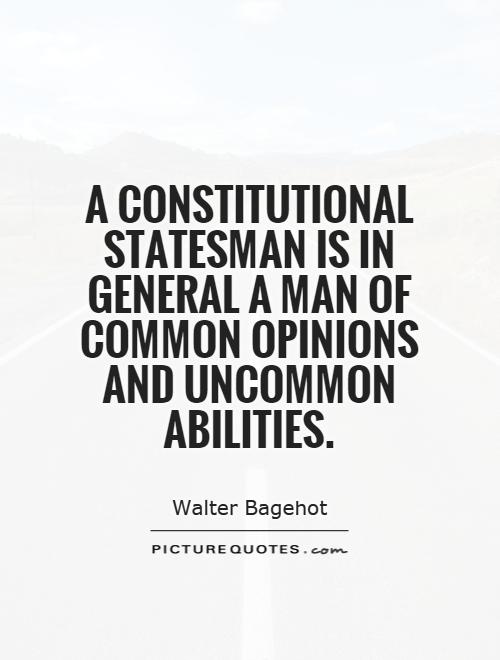A constitutional statesman is in general a man of common opinions and uncommon abilities

A constitutional statesman is in general a man of common opinions and uncommon abilities
Walter Bagehot, a prominent British journalist, economist, and political analyst, was known for his keen insights into the workings of the British constitution. His famous quote, "A constitutional statesman is in general a man of common opinions and uncommon abilities," encapsulates his belief that successful leaders in a constitutional system possess a combination of ordinary beliefs and extraordinary skills.Bagehot believed that a constitutional statesman, someone who operates within the framework of a constitution, must have a deep understanding of the common beliefs and values of society. These common opinions serve as the foundation upon which the statesman can build policies and make decisions that are in line with the will of the people. Without a firm grasp of the prevailing opinions and attitudes of the populace, a statesman would struggle to govern effectively and gain the support of the people.
However, Bagehot also recognized that mere adherence to common opinions was not enough to make a successful statesman. He argued that true leadership required uncommon abilities, such as intelligence, vision, and charisma. These exceptional qualities set a constitutional statesman apart from the average politician and enabled them to navigate the complexities of governance with skill and finesse.
Bagehot's assertion that a constitutional statesman must possess both common opinions and uncommon abilities reflects his belief in the delicate balance between popular support and leadership prowess. A statesman who is too ordinary may lack the vision and creativity needed to address the challenges of governance, while a leader who is too exceptional may struggle to connect with the people they serve.












 Friendship Quotes
Friendship Quotes Love Quotes
Love Quotes Life Quotes
Life Quotes Funny Quotes
Funny Quotes Motivational Quotes
Motivational Quotes Inspirational Quotes
Inspirational Quotes